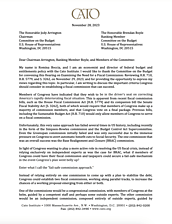Dear Chairman Arrington, Ranking Member Boyle, and Members of the Committee:
My name is Romina Boccia, and I am an economist and director of federal budget and entitlements policy with the Cato Institute. I would like to thank the Committee on the Budget for convening this Hearing on Examining the Need for a Fiscal Commission: Reviewing H.R. 710, H.R. 5779, and S. 3262, on November 29, 2023, and for providing the opportunity to express my views regarding this topic. In particular, I am writing to discuss the important criteria Congress should consider in establishing a fiscal commission that can succeed.
Members of Congress have indicated that they wish to be in the driver’s seat on correcting America’s rapidly deteriorating fiscal situation. This is apparent from recent fiscal commission bills, such as the House Fiscal Commission Act [H.R. 5779] and its companion bill the Senate Fiscal Stability Act [S. 3262], both of which would require that members of Congress make up a majority of commission members, and that Congress vote on a final package. Previous bills, including the Sustainable Budget Act (H.R. 710) would only allow members of Congress to serve on a fiscal commission.
Unfortunately, this very same approach has failed several times in US history, including recently in the form of the Simpson-Bowles commission and the Budget Control Act Supercommittee. Even the Greenspan commission initially failed and was only successful due to the immense pressure on Congress to avert automatic benefit cuts to Social Security. The one commission that was an overall success was the Base Realignment and Closure (BRAC) commission.
In light of Congress wanting to play a more active role in resolving the US fiscal crisis, instead of relying exclusively on independent experts as was the case for BRAC, what if members of Congress could have their fiscal commission and taxpayers could secure a fail-safe mechanism in the event Congress’s plan went belly up?

This work is licensed under a Creative Commons Attribution-NonCommercial-ShareAlike 4.0 International License.

